20 Best Keyword Research Tools (2022)
This is an extensive list of the best keyword research tools.
By the end of it, you will have a lot of great options. We will cover every tool thoroughly, so you will be able to select the right one for yourself.
Ready to grow your organic traffic?
Let’s dive in.
Best Keyword Research Tools
Soovle

Source: Soovle.com
Soovle scraps all the relevant keywords from various sources around the internet.
These platforms include:
- Amazon
- YouTube
- Yahoo
- Bing
- And, more
It can help you find a lot of profitable keywords that your competitors aren’t working on.
Prominent Feature of Soovle: Saved suggestions
A stand-out feature of Soovle, “Saved suggestions”, lets you create a list of keywords that you might want to consult later.
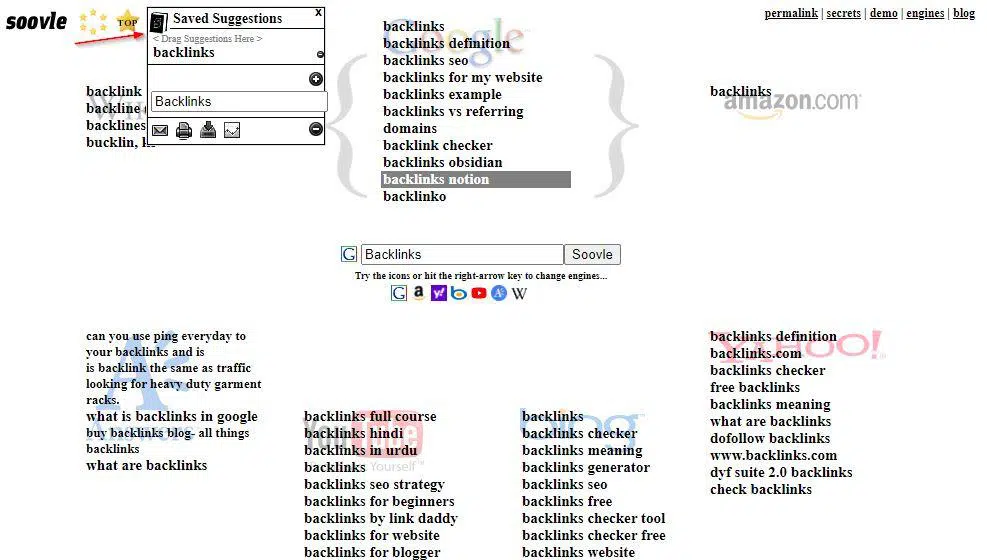
Source: Soovle.com
Just drag and drop the keywords that you would like the tool to save.
You could then download these keywords as a CSV file on your computer.
On the top right corner of your Soovle dashboard, you can see some options:
- Secrets: Soovle’s short and useful knowledgebase
- Demo: A short demo of how to use the tool effectively
- Engines: The search engines that Soovle scraps content from
- Blog: Soovle’s blog where you can learn more about the keyword research tool
Verdict: Soovle is one of the most effective keyword research tools in the market.
Jaaxy
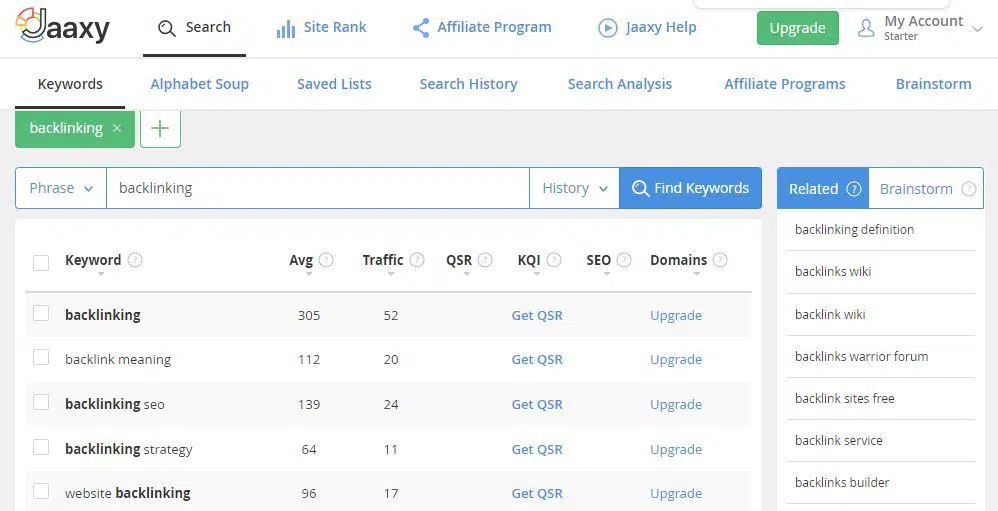
Source: Jaaxy.com
Jaaxy is another powerful keyword research tool. It gives you thousands of keyword research ideas within seconds.
Using Jaaxy is pretty straightforward.
Here is what makes this tool a unique one:
For starters, after you enter your seed keyword into the search bar, it returns an extensive list of related keyword ideas.
The list also includes a bunch of keywords that you won’t normally find from any other keyword research tool.
Not only that, but Jaaxy also provides useful data against every keyword, as any good keyword research tool should.
This includes:
- Search volume
- Potential traffic
- Competition
Jaaxy’s stand-out feature: Quoted Search Result.
Don’t’ get confused by the name; Quoted Search Result just means how many competitors are trying to rank for a particular keyword.
Of course, you want this number to be as low as possible in order to rank high in SERP (search engine results page).
Verdict: Jaaxy is one of the best keyword research tools for the price. It’s a freemium tool, so you can test it out without paying for anything.
Of course, once you upgrade, you get additional features like QSR. Although it’s not as sophisticated as Ahrefs or SEMRUSH, it does what it’s supposed to do cost-effectively. The paid plan of the tool comes at $50/month.
You may also like – Keyword Research Made Easy
Google Search Console
If you have ever used Google Search Console, you would know that it’s not a keyword research tool. Not a traditional one, at least.
But, it has a feature that helps you find profitable keywords easily.
Google Search Console is ideal for finding hundreds of opportunity keywords.
The feature that lets you find these keywords is the “Performance Report”.
The report gives you a list of posts or pages on your site that attract the most visitors from Google’s search engine.
Not only that, but you get to know the keywords that brought those visitors there.
How do you use the feature for keyword research?
Simple: Leverage it for finding opportunity keywords.
Opportunity keywords are those that have a decent search-engine rank but aren’t at the top of the first page.
These keywords rank between #8 and #20 in Google’s search engine.
With a few upgrades to your content and some extra on-page SEO, you can get those pages to rank higher.
For instance, the average rank of a keyword is 10.2. You can put in a bit of extra work and boost its ranking to push it further up in the search results.
But, the real magic happens when you combine another Google tool with Google Search Console: Google Analytics.
Combining the two tools can be pretty helpful.
You would get actionable keyword data after integrating them together. Data that you don’t get when you use them separately.
You would know the clicks, impressions, CTR (click-through-rate), and average position of keywords.
Verdict: Google Search Console is pretty handy for finding opportunity keywords. It’s an underused and underrated tool that webmasters should focus on more.
Ahrefs Keywords Explorer
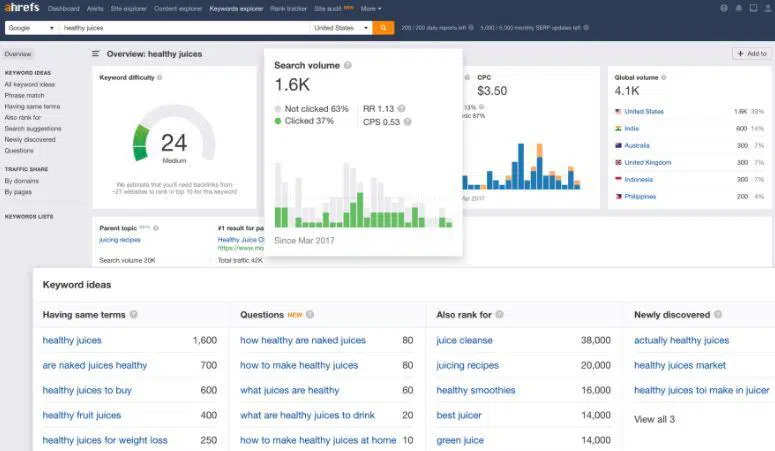
Source: Ahrefs.com
Although Ahrefs can be a little expensive, its keyword explorer is probably the most complete keyword research tool out there.
For every seed keyword that you enter, the tool spits out an extensive list of keywords with actionable data.
The company claims to have a database of more than 7 billion keywords, which keeps on updating every month.
Moreover, you can get keyword data from all over the world as the explorer supports 171 countries.
Plus, the tool doesn’t only focus on Google. You get an estimate of keywords’ volumes from a variety of search engines like YouTube and Bing.
Here is a unique feature of Ahrefs’ keyword explorer: It tells you the estimated number of clicks for your keyword. A metric that other keyword tools don’t show.
One of the most important metrics about a keyword is its SEO difficulty.
But, most keyword research tools tell you vague keyword difficulty data like “easy” or “difficult”. Some might give you a score like 90/100, but that isn’t accurate either.
Ahrefs’ keyword difficult not only tells you a score, but it also tells you how many backlinks you need to rank on the first Google page.
With Ahrefs, you have a good idea about the difficulty of a keyword. And, Ahrefs’ keyword difficulty score is more accurate than most other tools.
You will also love how the tool lets you filter your results and showcases the desired data instantly.
For instance, you can filter your keywords by search volume; from highest to lowest or vice versa.
In addition, Keywords Explorer lets you save your keywords lists to consult later.
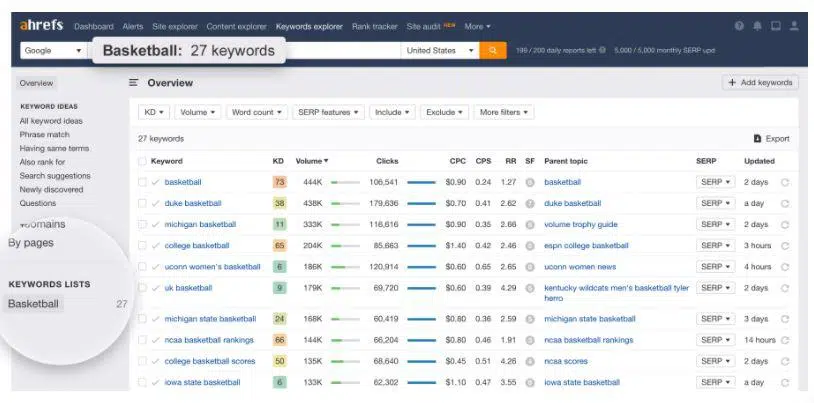
Source: Ahrefs.com
Verdict: Ahrefs is most popular for backlink analysis, but it has a pretty effective keyword research tool as well. Probably the best one considering the range of incredible features it offers.
SECockpit
SECockpit is a keyword research tool ideal for SEO pros.
It is a relatively obscured yet powerful keyword research tool designed for the pros.
Like any other tool, SECockpit takes a seed keyword and spits out a list of related keywords.
But, here is what makes it unique: You get a lot of insights on:
- Search trends
- Traffic estimates
- Organic competition
Clearly, the tool is custom-made for SEO professionals. So, you would need good SEO knowledge to effectively understand and leverage the metrics.
Sure, a newbie can use it too, but if you were to narrow down the ideal user of this software, it would be a seasoned SEO.
This is because the sheer number of data can easily get overwhelming for a brand new SEO. When you know what you are doing, you will be able to get the most out of this incredible tool.
Let’s see how SECockpit works now.
After logging into your SECockpit account, you have two options:
- Create projects for sets of keywords
- Do a single keyword search
Just click “Start a keyword search” to get started with the keyword research process.
After that, enter your seed keyword in the “Keyword phrase” field.
The tool lets you expand on your keyword data by incorporating Google Suggest, Related Searches, and even synonyms.
When everything is set, just click on “Save and Close”.
The keyword tool will get to work and produce a keyword report.
The data SECockpit displays is similar to what Google Keyword Planner shows. So, if you’ve ever used GKP, you will get the hang of it quickly.
In fact, it pulls “Phrase”, “Monthly searches”, and “CPC” right from Google Keyword Planner.
Here is the only difference: The CPC in SECockpit is “Top of page bid” in Google Keyword Planner.
Similar Article – What Is Keyword Cannibalization
Google Keyword Planner
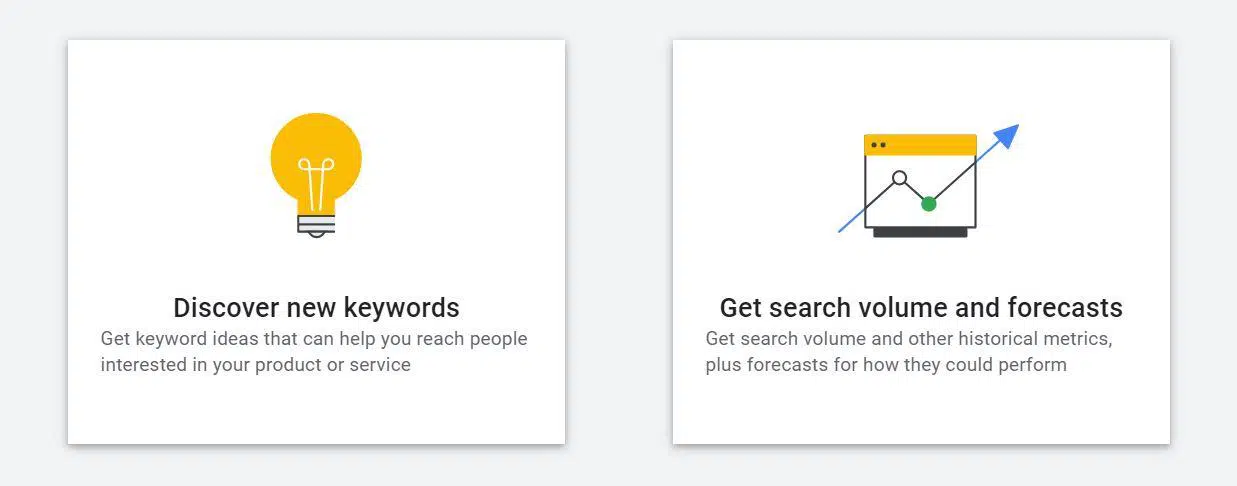
Source: Google.com
GKP lets you know about the keywords you should be targeting. You can’t doubt the credibility of this data as it comes directly from Google.
Go to “Discover new keywords” and enter your seed keyword or keywords.
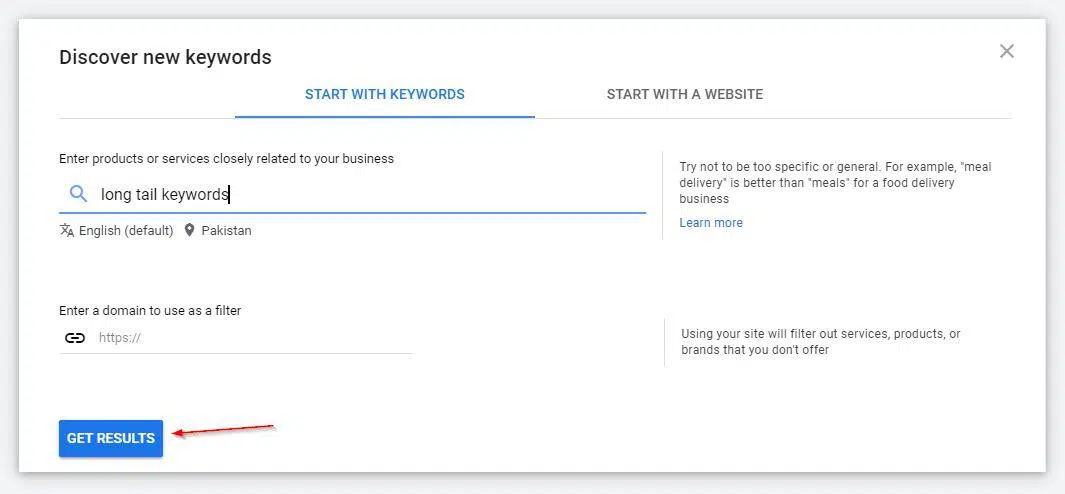
Source: Google.com
Click “Get results” and GKP will showcase a long list of related keywords with insightful metrics.
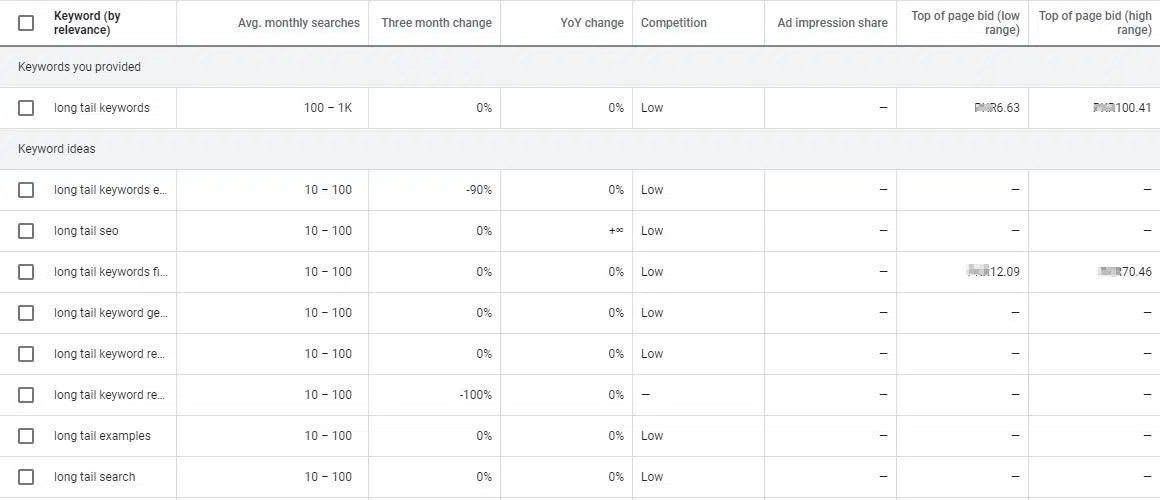
Source: Google.com
As you can see, although Google Keyword Planner does show the search volume for each keyword, it’s a rough range.
So, you just get a vague idea of how many times these keywords are being searched in Google.
But, there is a way around it; if you want to know the exact keyword search volumes, run a Google ads campaign.
Even the minimum amount of ad spend will unveil this feature in GKP.
A stand-out feature of Google Keywords Planner: Top of page bid.
Top of page bid is how much advertisers on Google are willing to pay for a click on a certain keyword.
The higher this bid amount for a certain keyword, the more competitive it is.
For instance, a keyword with a top-of-page bid (CPC) of $8 would mean higher competition than a keyword with a $3 bid.
You can also identify your keyword’s commercial intent from this metric. Obviously, the higher this amount, the more commercial intent that keyword has.
But, of course, Google Keywords Planner is designed for pay-per-click ad campaigns. So, using the metrics provided by the tool for SEO can be tricky.
Verdict: Google Keyword Planner is the most credible source of keyword data.
KeywordTool.io
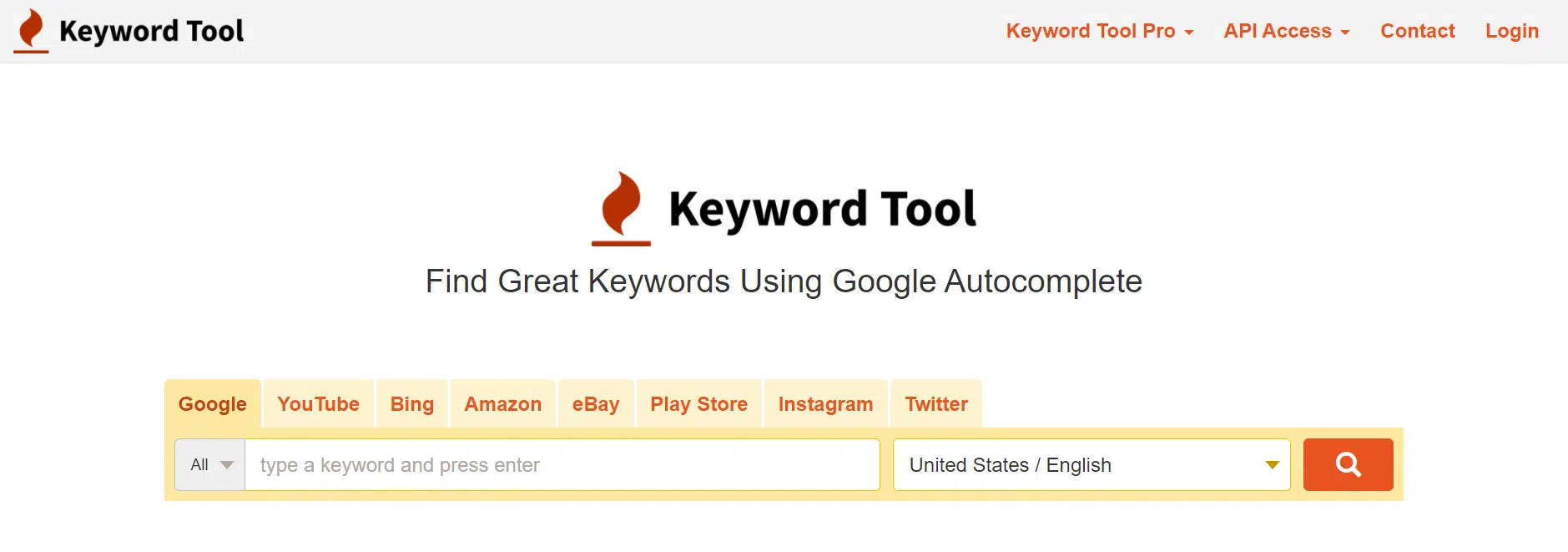
Source: Keywordtool.io
Here is another great keyword research tool for getting boatloads of keyword ideas.
Keyword Tool is another Google Suggest scraper like Soovle.
But, how is Keyword Tool unique from others?
For starters, Keyword Tool fetches a lot of keywords for you.
Let’s see what the tool pulls for the keyword “link building”.
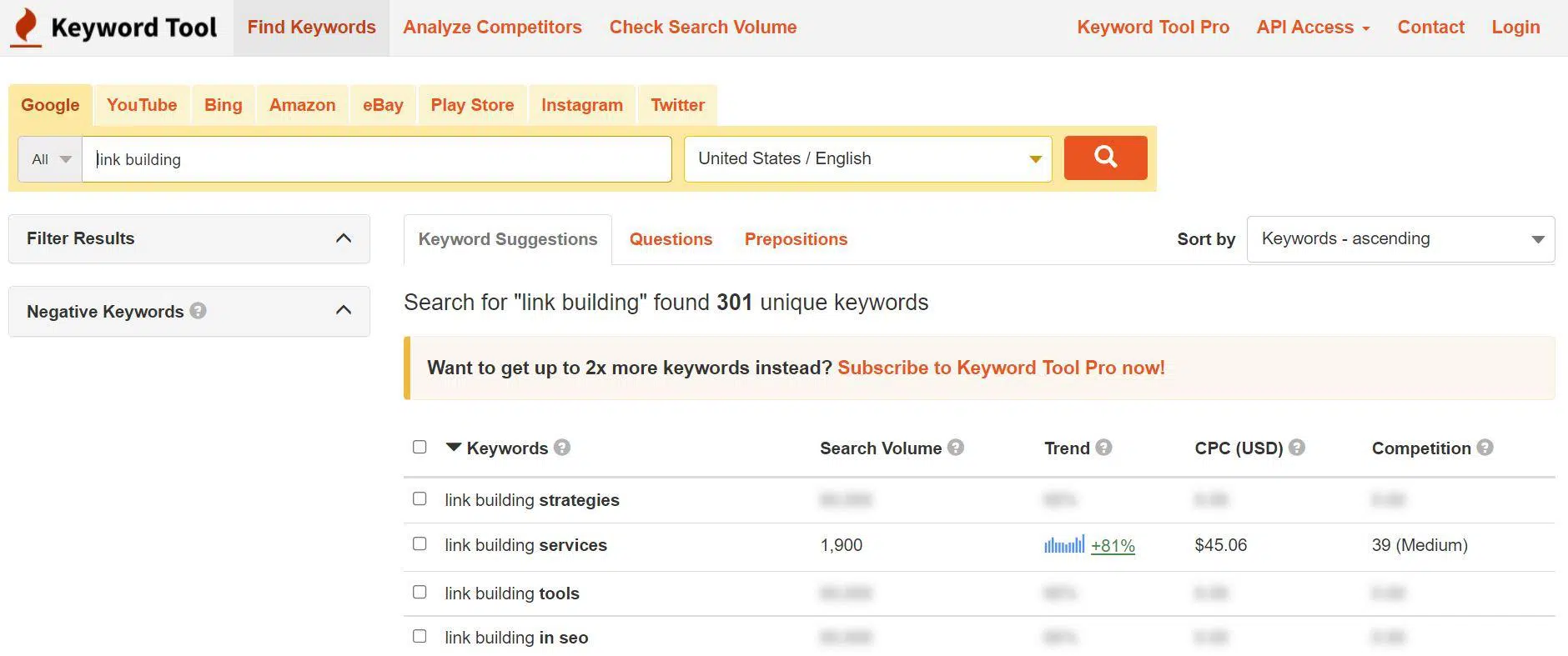
Source: Keywordtool.io
As you can see, Keyword Tool fetches 301 unique keyword ideas for a niche keyword like “Link building”.
Although Keyword Tool provides useful data for these keywords, you would have to be a paid member to see it.
Secondly, it lets you find relevant keywords for a variety of search engines. These include:
- YouTube
- Bing
- Amazon
- eBay
- Play Store
And, of course, Google.
You could even add negative keywords and remove any irrelevant words or phrases from the list of results.
Stand-out Feature: Competitor Analysis.
You won’t see this cool feature in many other keyword tools.
All you would have to do is, enter your competitor’s site and it will spit out a list of keywords according to that site’s content.
You can get a whole list of keyword ideas by using this single feature. Targeting the keywords that your competitor is targeting is an effective SEO strategy.
Verdict: Keyword Tool is one of the most effective and used keyword research tools out there. So, if you have a small budget, it’s definitely worth a try.
Moz Keyword Explorer
Moz Keyword Explorer helps you find keywords that can help you boost your search engine traffic.
The keyword research tool is incredibly effective at finding lateral keyword ideas for your blog or site.
For instance, if you search a seed keyword like “Keto diet” in its search bar, you get a list of related keywords.
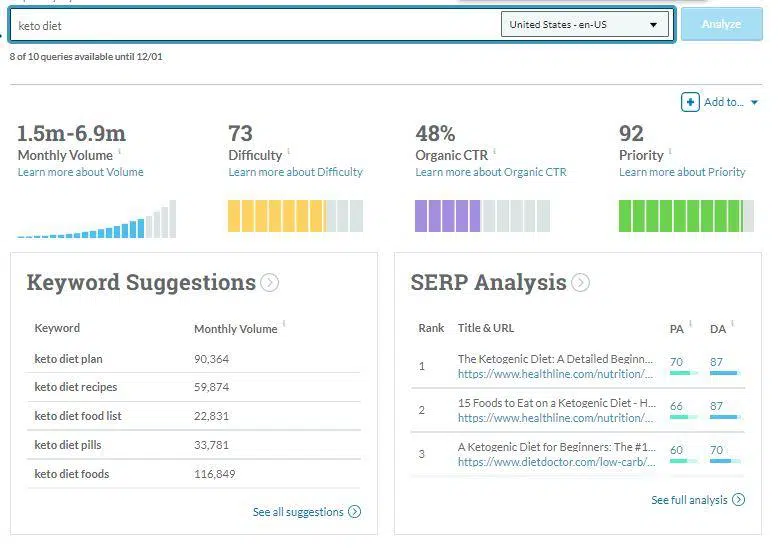
Source: Moz.com
But, it’s smarter than other keyword research tools.
This just means that the tool spits out some out-of-the-box suggestions. Suggestions that other tools won’t give you.
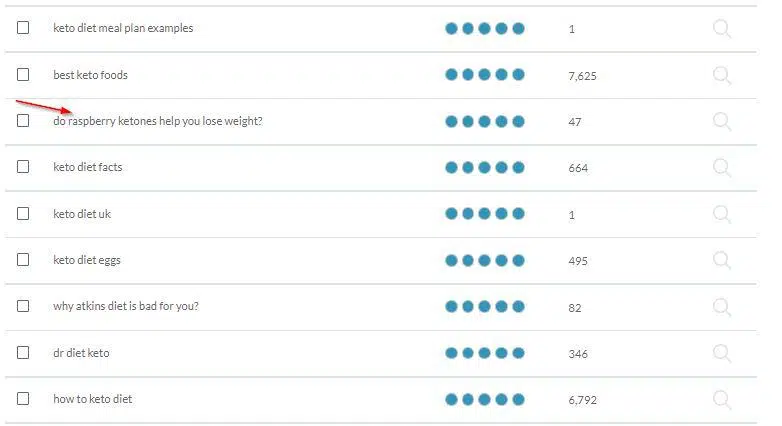
Source: Moz.com
The suggested keywords list offers a lot of content ideas to work with. If you want to narrow down your keywords, you can filter the ones that have your seed term.
Moz Keyword Explorer is one of the most holistic keyword tools out there. It automates most of the keyword research process and provides insightful data to base your SEO decisions.
It’s a freemium keyword research tool, so you can test-drive it before deciding to invest for the long term.
Plus, it is much more than search volumes. You get a lot of insight into your seed keyword.
This includes:
Difficulty: Tells you how difficult it is to rank for a specific search query on Google or other search engines.
Of course, the higher the difficulty score in terms of numbers, the tougher the keyword would be to rank on.
Organic CTR (Click-through rate): This means what percentage of users are actually clicking on the search results.
The higher the organic CTR of a keyword, the better.
Why?
Because a lower CTR would mean two things:
- Users are either finding the answer to their query from Google through knowledge graph or featured snippet
- There are just too many ads to let the user visit an organic result
Moz Keyword Explorer tool tells you the organic CTR of a keyword to help you make sure that the keyword is worth ranking for.
Otherwise, even if you rank for such a keyword, you won’t be getting traffic.
Priority: The priority score is calculated from other metrics like keyword search volume, CTR, and difficulty.
A high priority would mean that the keyword in question has a high search volume and low difficulty.
SERP Analysis: SERP analysis gives insightful information about the results on the first page of Google for a specific search term.
The metrics include:
Page authority: Lower page authority of first-page websites makes outranking them easier.
Domain authority: Tells you how authoritative the website overall is.
Linking domains: High linking domains make a website more difficult to compete with.
Verdict: The keyword tool of Moz is incredibly helpful and is one of the most trusted ones out there. However, you do have to purchase the whole SEO package from Moz in order to use the tool, as it doesn’t come standalone.
You may also like – Long Tail Keywords for SEO
Keywords Everywhere
Keywords Everywhere is a tool that provides you with a lot of keyword ideas.
The good thing is: It fetches this data right from Google Keyword Planner, so it’s fair to assume that it would be accurate.
Keywords Everywhere displays the keyword data right on Google’s first page. So, you would be searching for a term normally to get actionable insight.
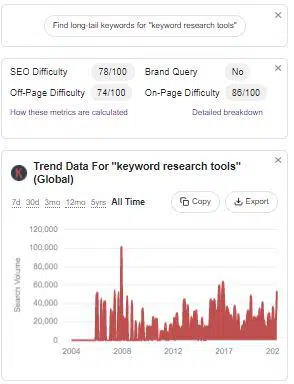
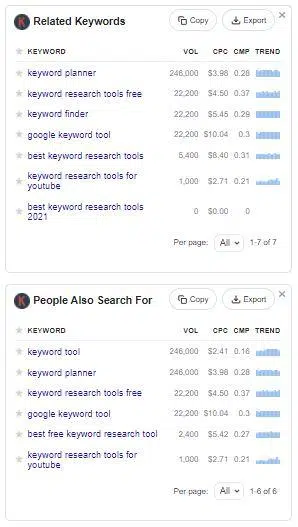
A lot of those keywords are long-tail keywords, which are relatively low-competition.
Here are the metrics that Keywords Everywhere shows:
Vol: The number of searches for a particular keyword per month.
CPC: Cost-per-click is the money advertisers are ready to pay to rank for that particular keyword.
CMP: Competition, as the name suggests, is how difficult it is to rank for a keyword. Of course, you want this fraction to be as low as possible.
Trend: This one is probably the most unique feature of this keyword research tool. The trend metric shows you the monthly search volume of a keyword for the whole previous year.
You can have a good idea about the seasonality of a keyword and if its demand is increasing or not.
Unlike many other tools, Keywords Everywhere’s CMP is calculated in fractions. So, if you see a CMP score of “0.1”, this just shows the difficult score of 10 out of 100.
Moreover, the keyword research tools also let you download all the suggested keywords in a CSV file.
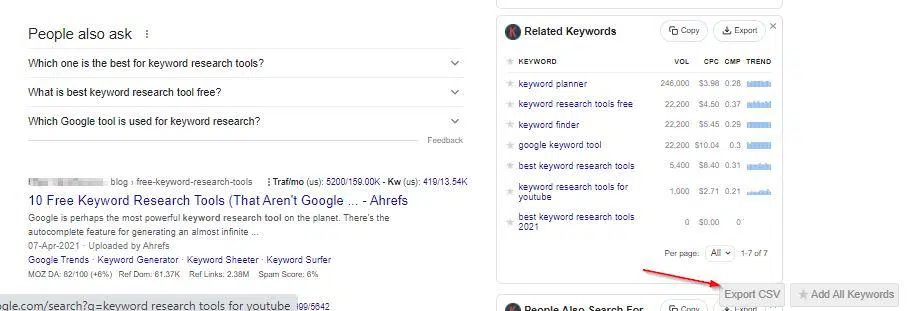
Here is something you need to do before using the tool: Adjust the settings according to your needs.
Otherwise, you could waste your Keywords Everywhere credits (more on this later).
Just go to the settings icon at the top right corner after clicking on the Keywords Everywhere extension.
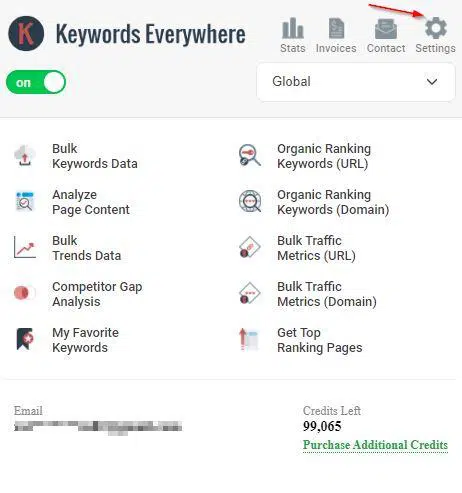
The first thing you want to set is the data source.
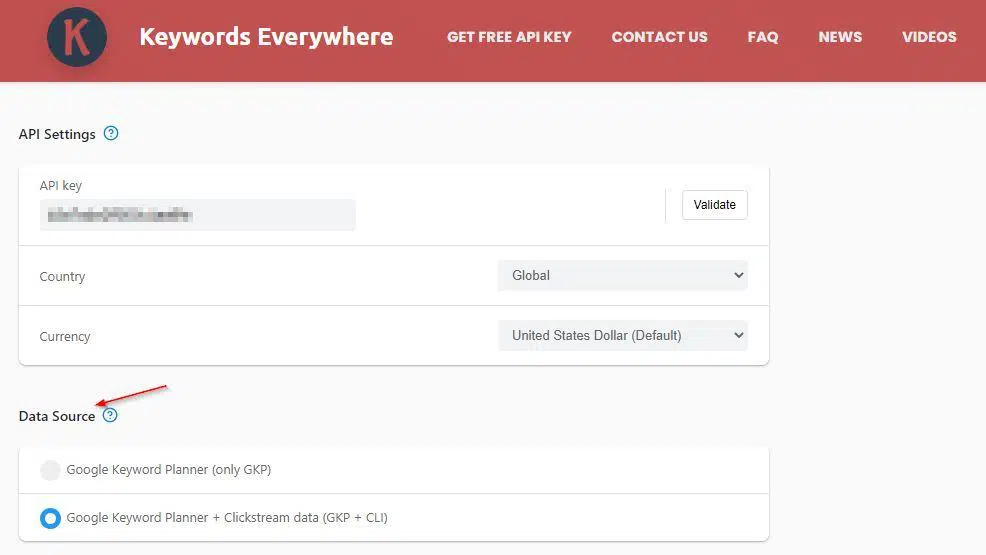
You could use the clickstream data in addition to Google Keyword Planner’s data to get more results.
Then, you need to select the metrics you want the tool to show. You only want to select the metrics that are useful to you.
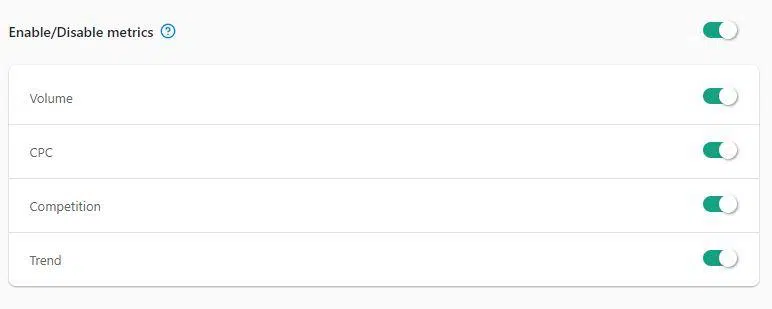
For instance, if you know don’t want it to show the trend data, just toggle the button off.
You can even highlight the most important metrics.
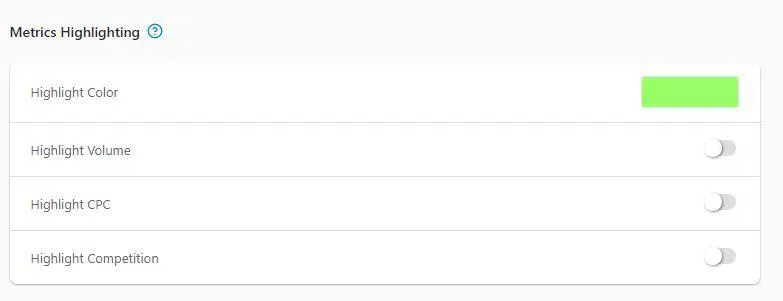
Next, you can select the websites that you want the tool to show data on.
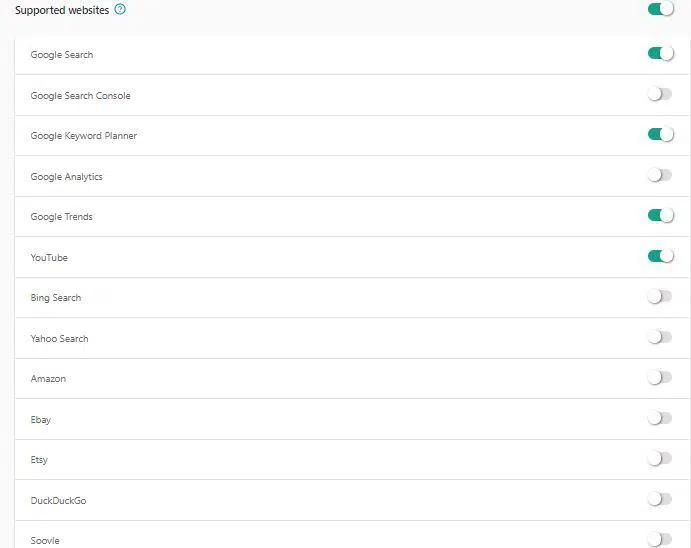
A stand-out feature of Keywords Everywhere: “People also searched for”.
This lets you tap into the keywords that your audience is searching for related to your seed keyword.
Another great thing about Keywords Everywhere is that it’s incredibly cost-effective.
You get a lot of credits for just $10. There is no subscription or recurring fee. Just buy the credits and use them for the next year.
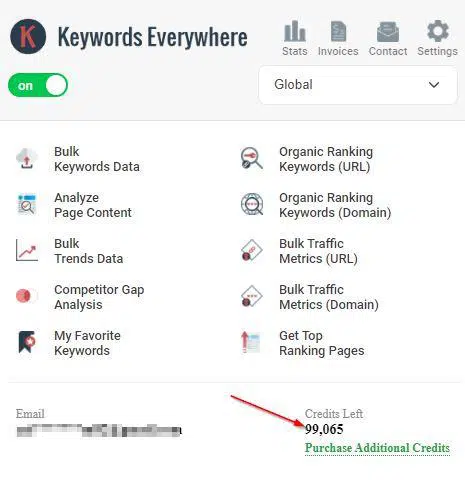
Verdict: Keywords Everywhere is one of the best keyword research tools out there. If you want to tap into a lot of profitable keywords conveniently, you need to try Keywords Everywhere out.
Keyword Snatcher
If you are looking for a lot of keywords under one roof, your quest should end with this tool.
Keyword Snatcher is a dream come true if you want to have an extensive list of keywords to target.
In fact, after you enter your seed keyword and hit the search button, the tool will spit out at least 2000 related keywords.
Here is how Keyword Snatcher works:
Open up the tool and choose the resources that you want it to “Snatch” keywords from.
These include:
- Yahoo
- Bing
- Amazon
- eBay
- YouTube
If you want to generate as many keyword ideas as possible, keep all of them checked.
Next, you will need to enter the keyword and hit “Get suggestions”.
The tool will fetch an insane amount of keyword suggestions for you, but you will have to wait for a bit.
However, there is a downside to this keyword tool.
It’s a simple keyword suggestion tool and doesn’t give you the data for those keywords.
So, while you get a lot of content ideas, you don’t get the keyword search volume, competition, and CPC.
But, there is a way to get that information.
After getting the keyword suggestions, you can simply download the list as a CSV file. Just click on “Download suggestions”.
Open Google Keyword Planner and copy-paste these keywords into it.
Unique feature: Word Count
Keyword Snatcher lets you filter keywords on the basis of the number of words.
So, if you are looking for long-tail keywords only, select “4” and the tool will filter out the phrases with four words.
Verdict: It’s not the best keyword research tool in the world, especially because it doesn’t give any data on the keywords.
But, there is no subscription fee for the tool and it gives you ridiculous amounts of keyword ideas to work with.
Google Trends
Google Trends helps you find new keywords and know the search trends.
There are a couple of ways you can use Google Trends to do keyword research.
You can enter your seed keyword and see additional keyword ideas in the “related queries” section.
Or, you can observe the trend of your keyword and have an idea of its popularity in the coming days.
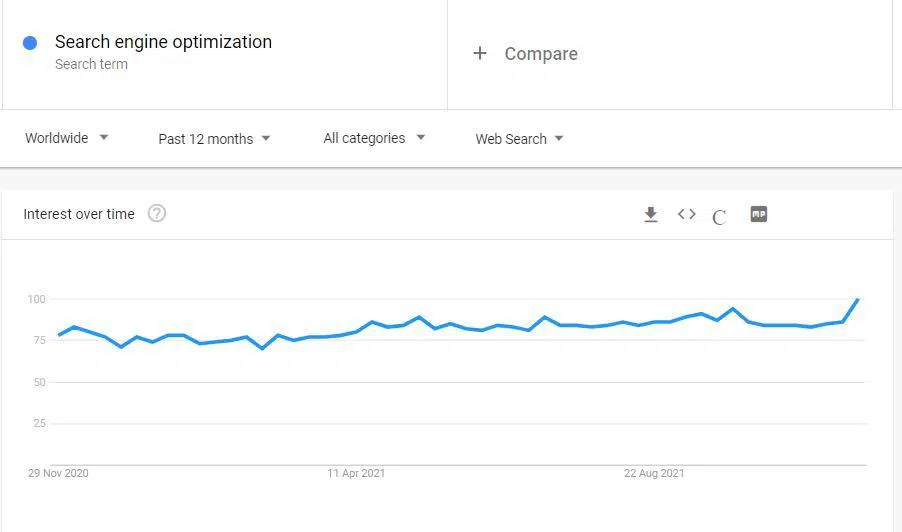
Source: Google.com
Why do keyword trends matter?
Because, if you target a keyword that has been going down in popularity, it wouldn’t be as profitable.
You want to target keywords that are growing in popularity.
Plus, Google Trends tells you whether a keyword is ever-green or seasonal. Seasonal keywords, as the name suggests, get popular in a particular season.
So, you can’t expect to get traffic from such keywords all around the year.
On the flip side, ever-green keywords never lose their popularity. Their graph tends to remain constant and at a decent level.
You want to target such keywords as these tend to bring in consistent traffic for the long term.
Another useful feature of Google Trends is “YouTube Search”.
Using it, you can find out whether your seed keyword is growing in popularity on the world’s second most popular search engine.
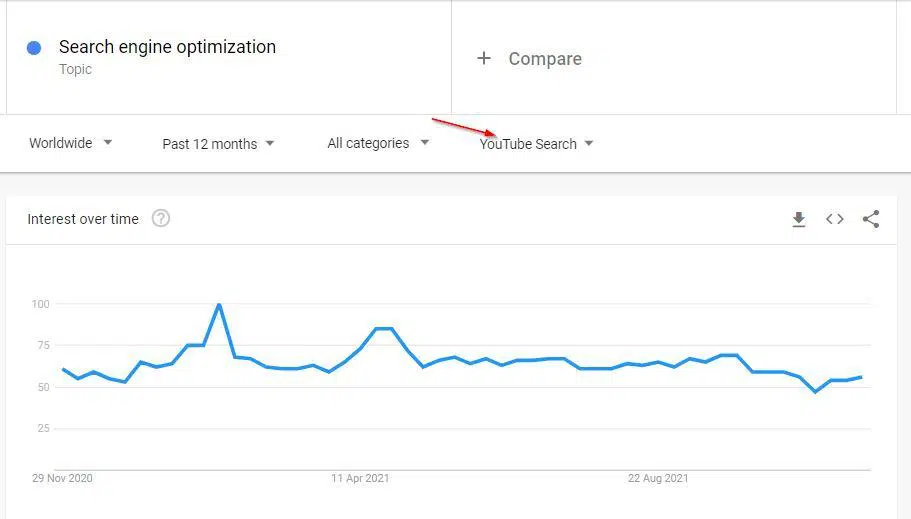
Source: Google.com
Verdict: If your focus is on producing content around ever-green keywords, you need to consult Google Trends regularly.
That way, you can see if your keywords can bring you traffic in the long run. Then, you can write on those keywords confidently.
Similar Article – 5 Quick Keyword Research Tips and Tricks
SEMrush
SEMrush is one of the leading SEO tools out there, and its keyword research tool works differently than most other tools.
SEMrush doesn’t only give you a long list of related keywords after you enter a seed keyword.
It also spits out a list of keywords your competitor is already ranking for.
This lets you compete with your rival on the search engine and snatch their rankings.
The tool gives you unique keywords that you can’t get using most other keyword research tools.
Let’s see how SEMrush’s keyword research works.
Go to SEMrush’s domain overview under “Competitive analysis”.
Enter your competitor’s domain name and hit enter.
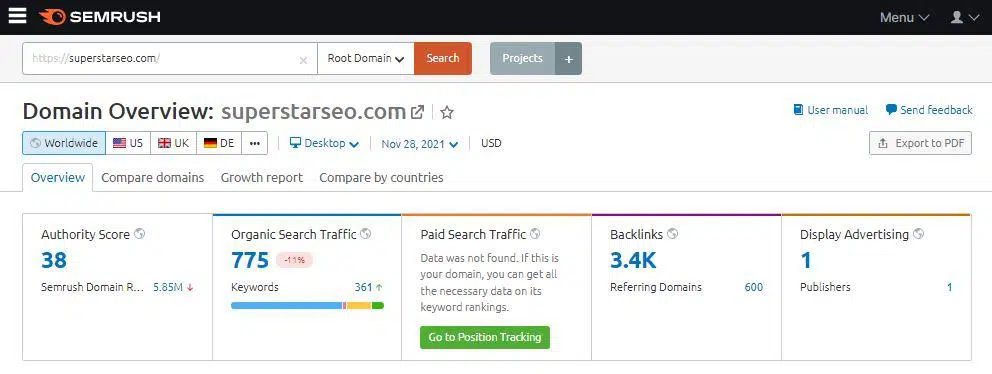
Source:Semrush.com
If your SEO focus is a particular country, say the US, you can choose that country from the drop-down menu.
First, take a look at the organic search traffic report.
It shows the number of keywords your competitor ranks for.
SEMrush also gives you the number of backlinks pointing to that particular website.
But, you get the real value under the “Top organic keywords” report.
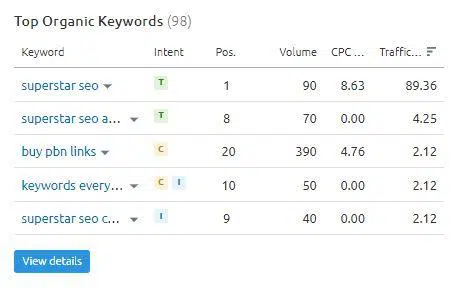
Source: Semrush.com
This report gives you the top 5 organic keywords that your competitor is ranking for. Just click on “View details” if you want to know more.
You can also see the position, volume, CPC, and traffic (percentage of organic traffic to this website).
The “Top organic keywords” feature alone gives you a list of profitable keywords to work on.
If you want more keyword ideas, check out the “Main organic competitors” report.
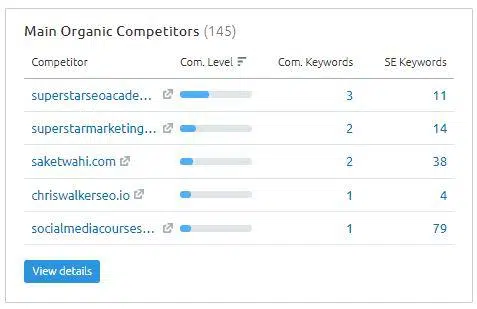
Source: semrush.com
You will now have a list of websites competing with that domain.
Click on one of those competitors and you will see the same report with a new list of organic keywords it ranks for.
There can be some overlap but you will get a good number of additional keywords with this method.
You can also enter your seed keyword/s into SEMrush’s “Keyword overview” tool.

Source: Semrush.com
SEMrush will not only give you actionable insight on the keyword but will also list a lot of related keywords.
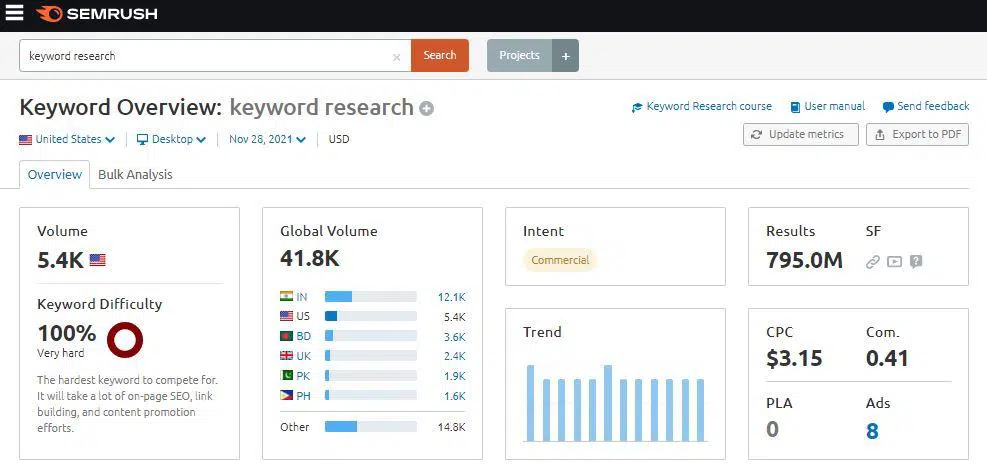
Source: Semrush.com
Have a look at the number of related keywords SEMrush fetches.
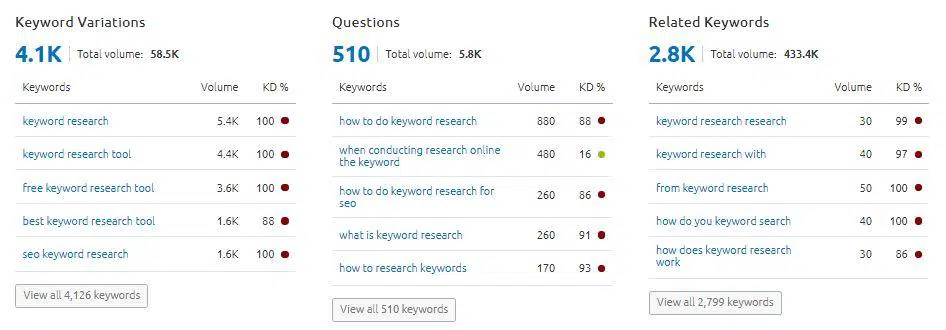
Source: Semrush.com
Another incredible feature of SEMrush is the “Keyword magic tool”.
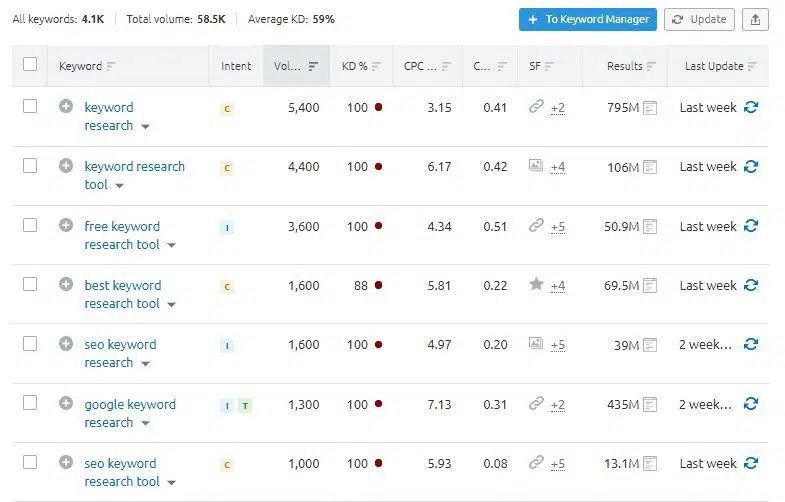
Source: Semrush.com
It pulls these long-tail variations of your seed keyword from the massive 800+ million database of SEMrush.
Verdict: SEMrush is one of the best keyword research tools in the world. Although it can be expensive, if you are serious about doing search engine optimization, you need to let this tool work for you.
KWFinder
KWFinder is an easy-to-use and powerful keyword research tool.
One of the reasons why you would want to get your hands on this tool is its intuitive user experience.
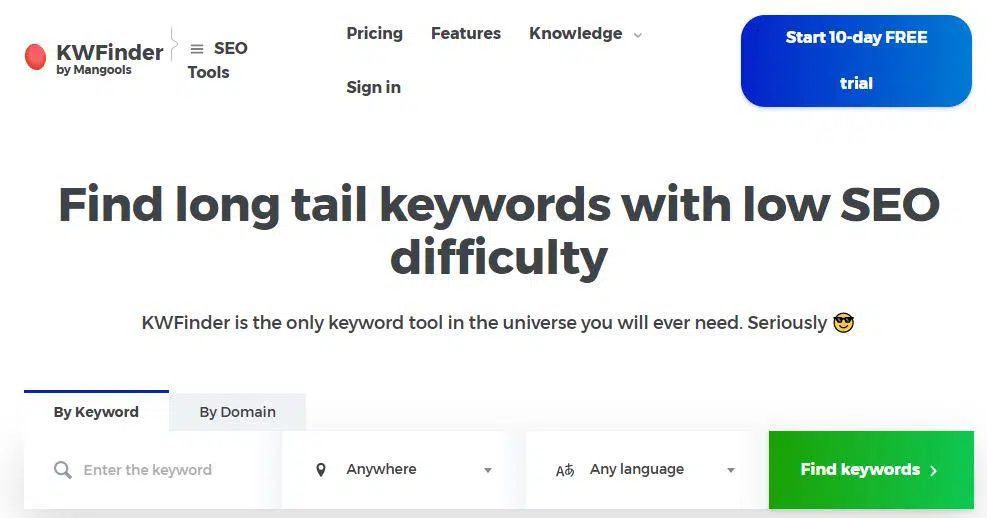
Source: kwfinder.com
Otherwise, it has pretty much the same features as any other good keyword tool.
A nice little feature of KWFinder is “Keyword Difficulty”.
This tells you how tough it will be to rank for that particular keyword.
Moreover, you won’t have to click on a keyword to see its difficulty score. You see the metric in front of every keyword.
Verdict: With just a $29/month subscription and a variety of features, KWFinder is one of the most cost-effective keyword research tools out there.
QuestionDB
With QuestionDB, you can find a boatload of question keywords for free.
QuestionDB extracts these questions directly from Reddit threads.
It’s similar to Answer The Public. So, if you are looking for an alternative, QuestionDB won’t disappoint you.
Using the tool is pretty straightforward; just enter your seed term and it will produce a list of questions.
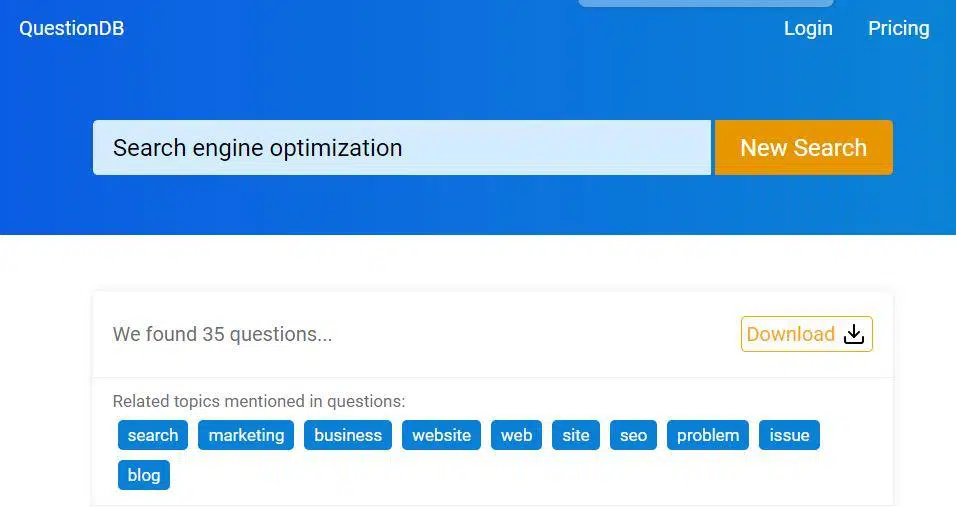
Source: questiondb.io
But, you don’t have to find questions only. It shows keywords, too.
Just select “Keywords” in the drop-down menu above the list of keywords.

Source: questiondb.io
Verdict: If you want to know question-focused keywords around your blog posts’ topics, you need to use QuestionDB.
Serpstat
Serpstat, as the name might suggest, helps you analyze the first-page competition for a keyword.
Serpstat is a full suite of software with a variety of tools for link building, content, and more.
So, it isn’t a standalone keyword research tool.
But, that shouldn’t mean its keyword research feature is any less effective.
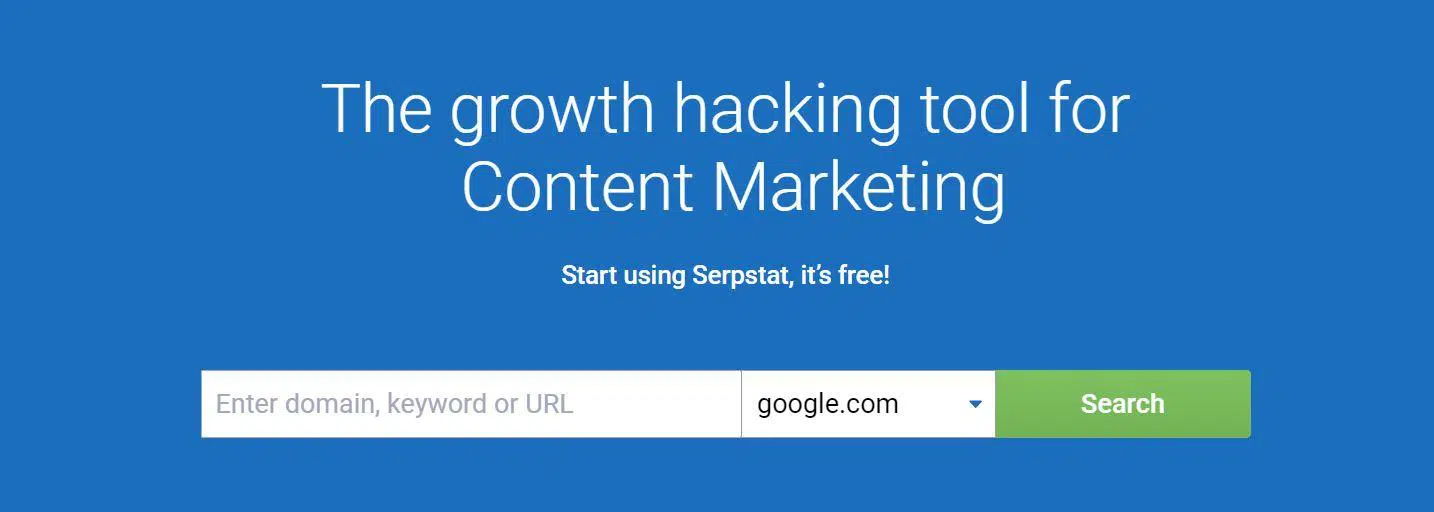
Source: serpstat.com
Here is how Serpstat’s keyword research tool looks like after searching for a keyword:
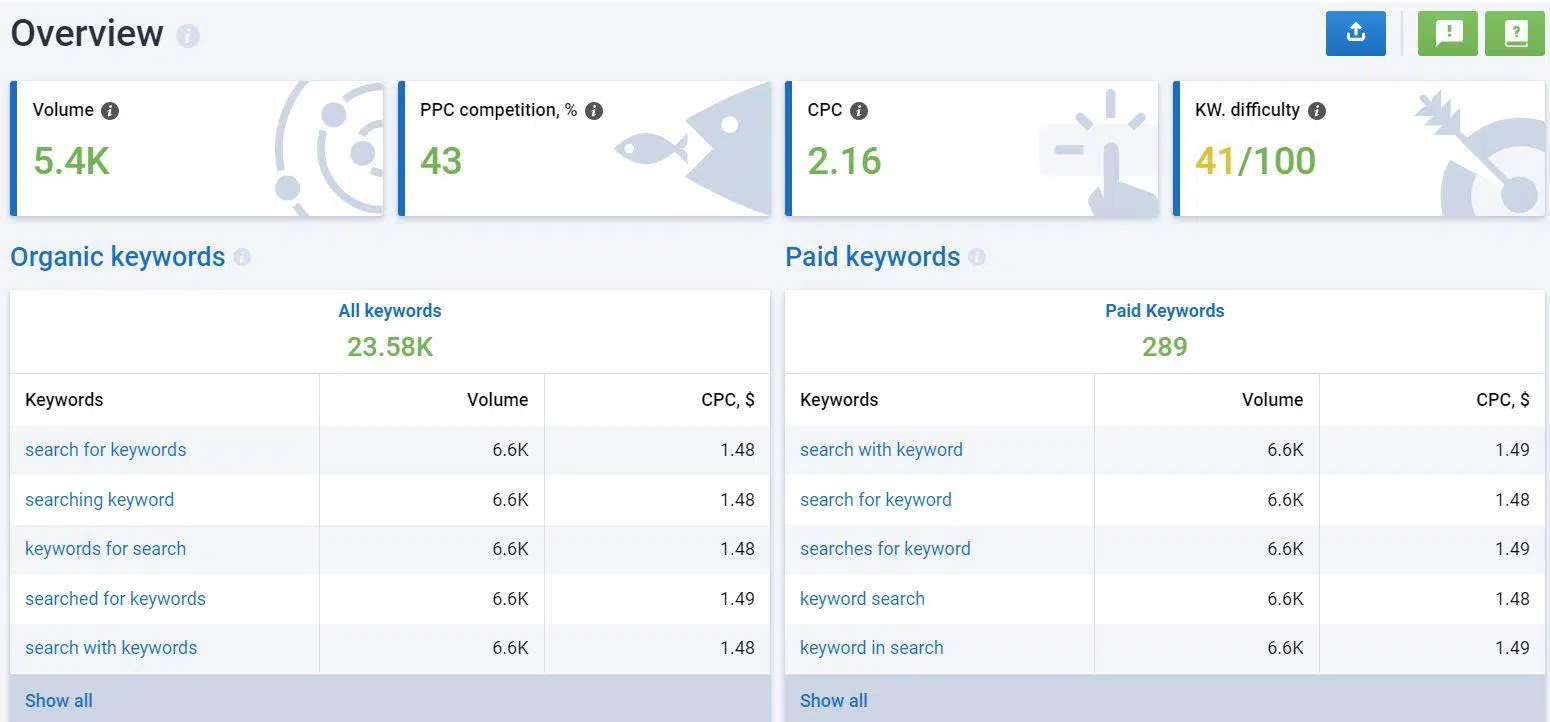
Source: serpstat.com
Stand-out feature: Competitors Graph
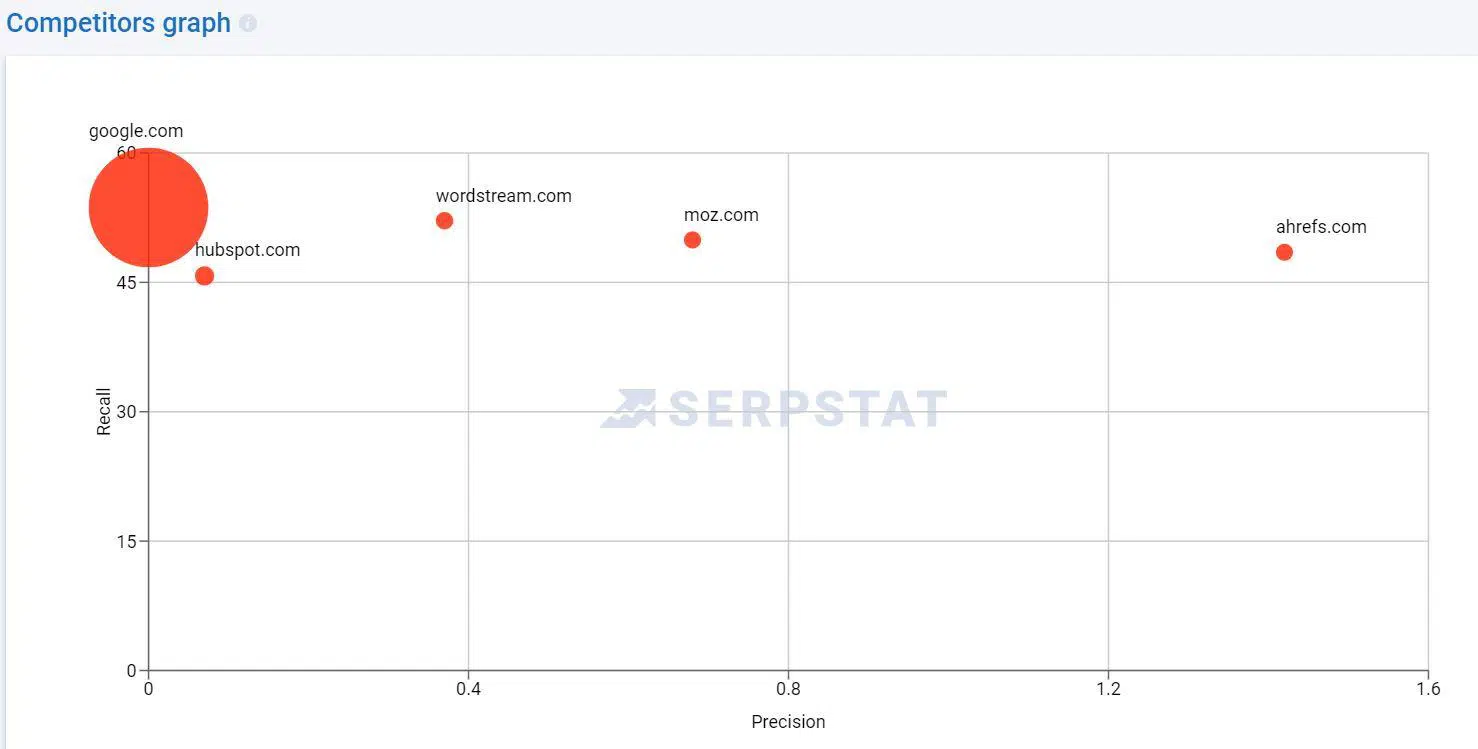
Source: serpstat.com
“Competitors Graph” lets you visualize the websites that are competing for the seed and related keywords.
So, if you see big sites like Wikipedia ranking for a keyword, you want to look in the other direction.
Verdict: Serpstat is a unique and effective keyword research tool. Plus, with just $19/month, it provides great value for money.
Keyword Sheeter
Keyword Sheeter is ideal for generating heaps of keywords. It pulls data right from Google Autocomplete.
Just put single or multiple keywords and hit “Start Sheeting”.
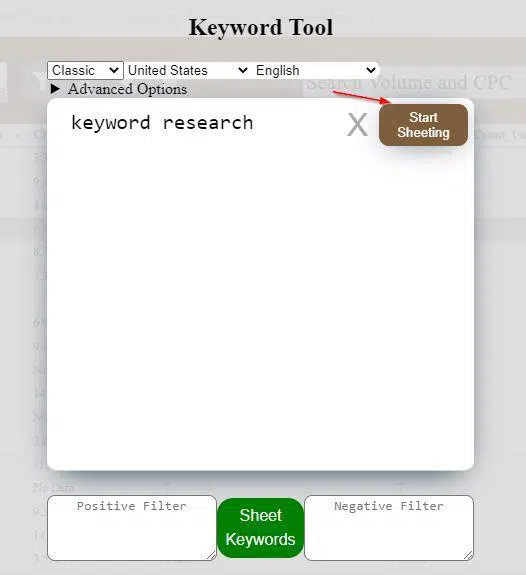
Source: keywordsheeter.com
The keyword tool will now start listing keywords, even more than you might need.
Sometimes, it just goes on and on. If you feel you don’t need more keywords, just click “Stop”.
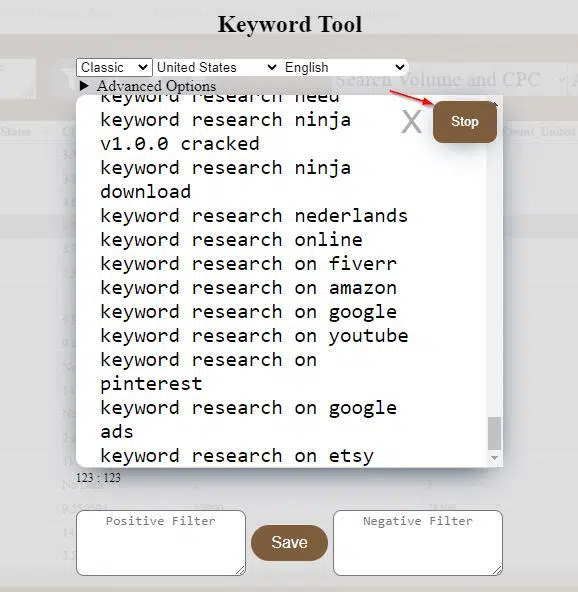
Source: Keywordsheeter.com
When you add a positive filter (keywords), Keyword Sheeter only lists the results containing that keyword.
Or, if you want to exclude a keyword from the search results, you could add it in the “Negative Filter” box.
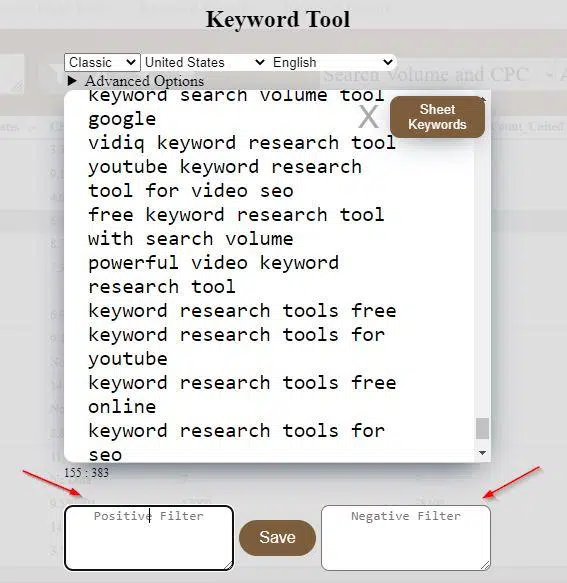
Source: keywordsheeter.com
This is pretty helpful when you want to exclude irrelevant results.
Let’s say you want to get keyword ideas around “Apple” gadgets. You don’t want the tool to give you fruit recipes.
So, you put words like “Crumble”, “Pie”, and “Cider” in the negative filter box.
Keyword Surfer
Keyword Surfer is a completely free Google Chrome extension. It tells you the monthly search volume of any keyword you search in Google.
You can filter these keywords by country as well.
After enabling the extension, just search a keyword in Google normally and you will get the required information there.

As you can see, the phrase “Keyword research” has a monthly search volume of 6600 and a CPC (cost per click) of $10.67.
On the right-hand side, you will see a few related searches.
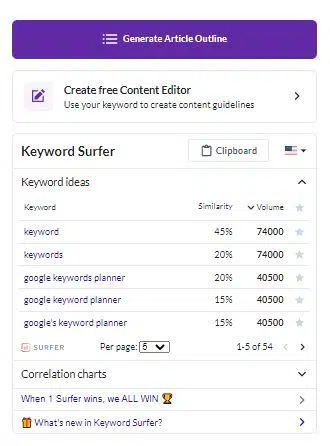
In addition to the search volume of your related keywords, you can see their similarity to your main keyword.
Also, Keyword Surfer allows you to create a content outline around your keyword for free.
Not only that, but you get to know the monthly visits, word count, and backlinks of every website on the first SERP.

Keyword Surfer works somewhat like “Keywords Everywhere”, a paid keyword tool that used to be free.
Verdict: An incredibly useful keyword research tool that’s completely free.
You may also like – Best Keywords Everywhere Alternatives
Keyworddit
Keyworddit is not like any other keyword research tool out there. It pulls in unique content ideas that your competitors aren’t probably working on right from Reddit.
Just enter a subreddit and the tool will extract up to 500 keywords with their monthly search volumes.
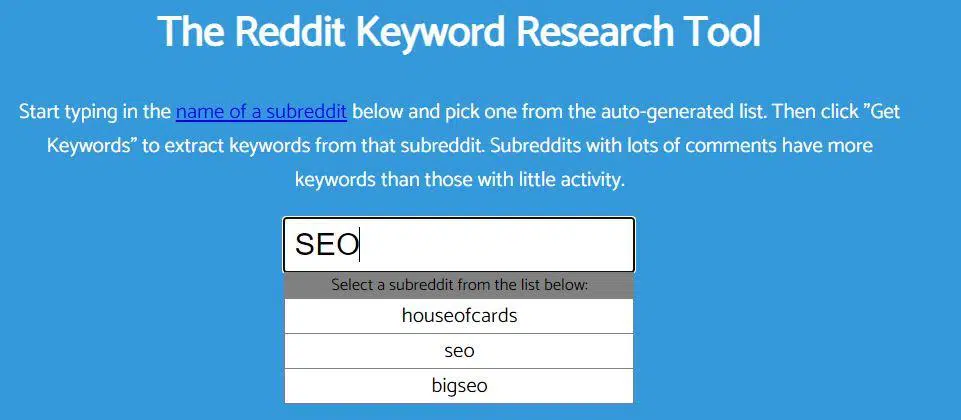
Source: highervisibility.com
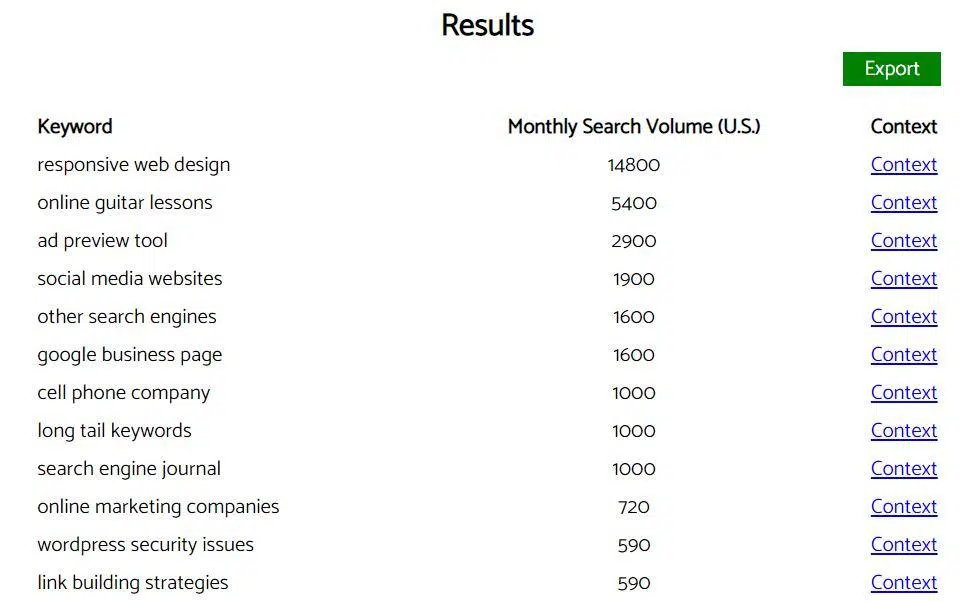
Source: highervisibility.com
And, there is an “Export” option in the top right corner using which you can download the list of keywords as a CSV file.
Keyworddit is an incredibly effective tool when you have no idea about a niche and want to get started.
For instance, if you want to start a blog on SEO, the above keyword list will help you understand what people are talking about.
This includes:
- Link building strategies
- Google Business Page
- Other search engines
- Responsive web design
Moreover, the tool showcases search volumes of these keywords, giving you an idea about their popularity.
In addition, if you want to learn more about a keyword, hit the “Context” link in front of it. You will see the Reddit thread Keyworddit pulled the data from.

Bulk Keyword Generator
Bulk Keyword Generator is an effective local keyword research tool.
It gives you keywords based on industry and location.
Here is how Bulk Keyword Generator works:
Step 1: Choose your industry.
Let’s take “Plumbing” as an example.
You will see a list of keywords in that particular industry. Choose the services you or your client offers.
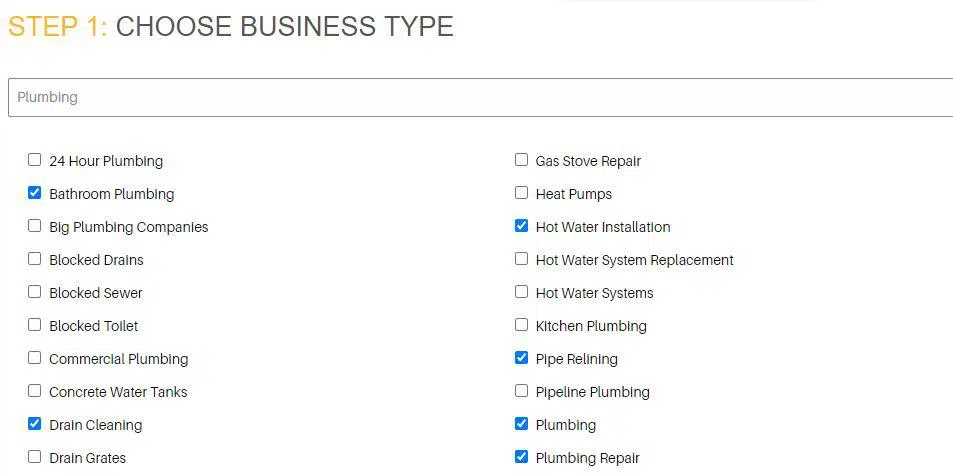
Source: Highervisibility.com
Step 2: You choose a location.
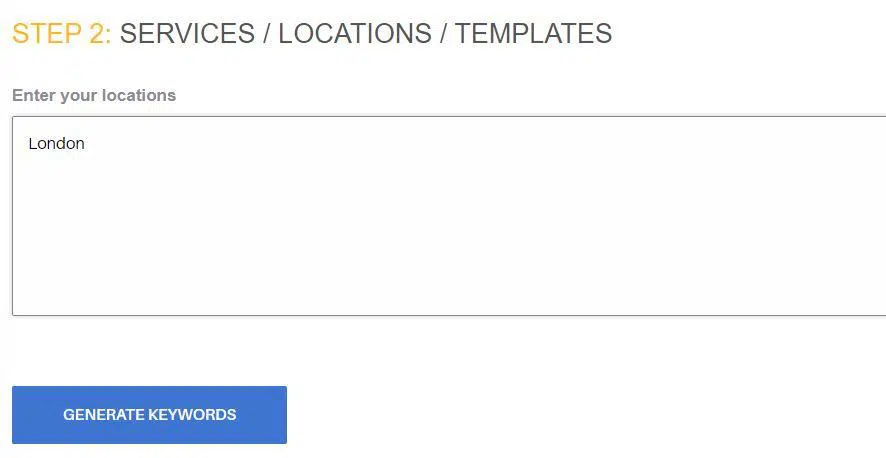
Source: Highervisibility.com
The tool will now append the location with your chosen services.
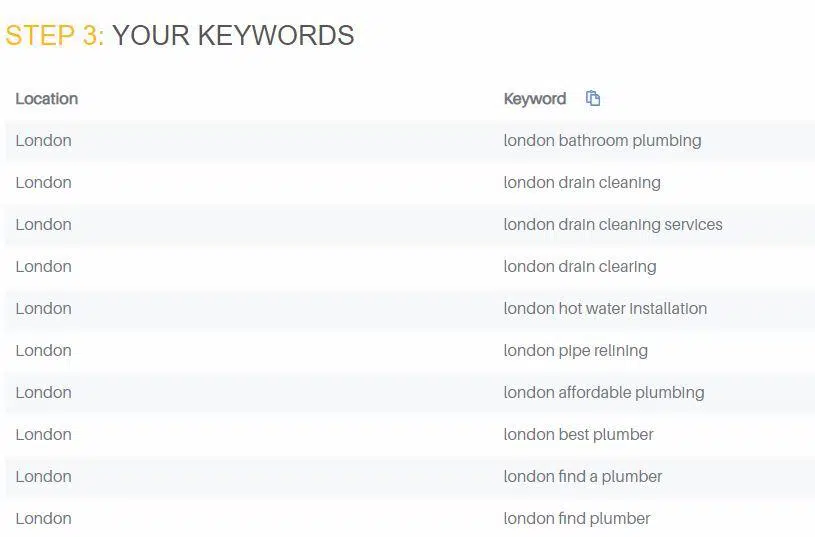
Source: Highervisibility.com
But, there is a problem: That isn’t actually the way users are searching for these services.
For instance, someone looking for a plumber in London won’t search “London best plumber”.
They would use “Best plumber” to find a professional in that locality.
What you could do is, copy those service keywords and put them into Google Keyword Planner. Then, choose the location.
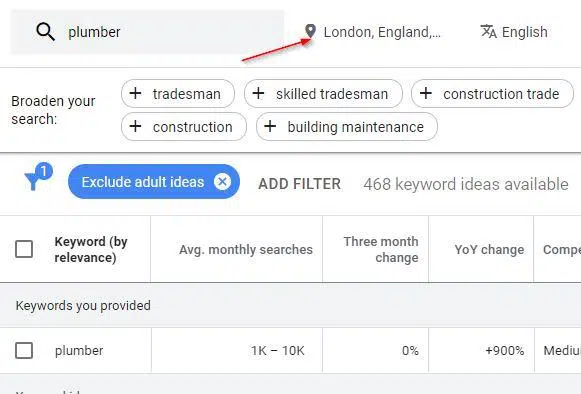
Source: Google.com
But, even if you use the tool without Google Keyword Planner, it gives you more than enough to work with.
Verdict: One of the few and most effective local keyword research tools out there.
Google is the most reliable keyword research tool if you know how to leverage it.
The keyword ideas that you get here are straight from the database of Google.
One of the best ways to find profitable keywords for any niche is Google autocomplete.
But, that’s not it.
Google’s “People Also Ask” box is a great resource of questions that your target audience is searching for.
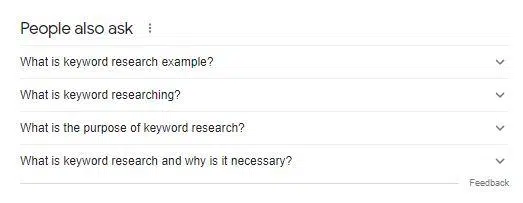
Source: Google.com
Moreover, you can even find more questions by clicking on any one of them. As you dive deeper, Google keeps on loading more.
But, you don’t want to produce content on a keyword without knowing the intent of the searchers behind it.
Let’s say you are selling gym equipment, but you rank your homepage for a topic like “How to lose weight”.
Would you be able to get any traffic to your homepage? Nope.
When people search that phrase, they intend to “Learn”, not “Buy”.
The point is, you want to rank your web pages for terms that align with the searchers’ intent.
Luckily, Google is the best resource for finding the intent behind a search.
For instance, if someone is searching for “What is SEO?”, they are looking for an informational piece rather than a commercial one.
If Google shows informational results like a featured snippet or beginners’ guide, know that the keyword has informational intent.
Whereas, if you see e-commerce shops against a query, understand that it’s a commercial-intent keyword.
Verdict: Google is one of the best keyword research tools when you know how to use it.
Over to You
These were the best keyword research tools out there. By now, you probably know which one is the right fit for you.
So, it’s time to start finding profitable keywords for your business. Over to you!
Similar Article – Choose the right keywords





